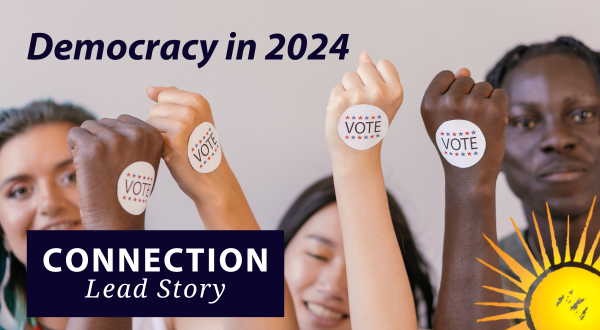
Lessons for Democracy in 2024
Advocates Agree That Voting Remains a Powerful Tool and Act of Engagement
Don Clemmer
March 1, 2024
One of the reasons politics seemed so broken in 2023 might have been because so many people separated the exercise of power from service:
- A faction of the U.S. House of Representatives kept trying — and failing — to make the very functioning of the government contingent on deep cuts to human needs programs.
- A former president on the campaign trail promised that a return to power would mean annihilation of his opponents.
- And at the state level, restrictive voting laws continued to threaten the participation of all people in a system that shapes their lives.
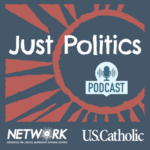 It all raises the question of the overall health of democracy in the U.S. and its prospects for weathering the 2024 elections — in the presidential race, Senate, House, and state-level contests. Advocates, academics, and leaders in the areas of faith and politics agree — and shared with NETWORK’s Just Politics podcast last year — that current threats to democracy require vigilance and action. Action includes rooting out Christian nationalism, opposing voter suppression, forging broader political alliances to work common problems, and showing up to vote.
It all raises the question of the overall health of democracy in the U.S. and its prospects for weathering the 2024 elections — in the presidential race, Senate, House, and state-level contests. Advocates, academics, and leaders in the areas of faith and politics agree — and shared with NETWORK’s Just Politics podcast last year — that current threats to democracy require vigilance and action. Action includes rooting out Christian nationalism, opposing voter suppression, forging broader political alliances to work common problems, and showing up to vote.
The Place of Faith in Politics

Dr. Rachel Kleinfeld
“This is much bigger than just elections,” says Dr. Rachel Kleinfeld, senior fellow in Carnegie Endowment for International Peace’s Democracy, Conflict, and Governance Program, who notes that the world has witnessed a global decline in democracy for the past 17 years. In consolidated democracies like the U.S. and Brazil, this has occurred because people elect populist, authoritarian leaders. “Just beating those leaders doesn’t mean that democracy is restored.”

Celina Stewart
“The threat has always persisted. The tools that are used each election cycle sometimes change, or sometimes they just get scaled in some way or another,” says Celina Stewart, chief counsel and senior director of advocacy and litigation for the League of Women Voters, of the particular threat of voter suppression. “Voting rights is really about empowering people to engage in their community, to have a voice in selecting the person or the group of people who will represent their interests.”
“When we start suppressing votes, and we start suppressing knowledge, we’re heading down a very dark road,” says Sr. Anita Baird, DHM, a member of NETWORK’s board. “As a church, we have failed to speak out on many of these issues.”
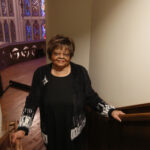
Sr. Anita Baird, DHM
As the threat of Christian nationalism has grown more visible in U.S. politics in recent years, NETWORK has vocally denounced the movement, as have other religious groups. The Baptist Joint Committee for Religious Liberty (BJC) is one of them.
“Christian nationalism takes that Gospel of love and perverts it into this false idol of power,” says Amanda Tyler, BJC’s executive director. She says it’s incumbent on Christians to call out where public assertions of Christian identity stray from the teachings of Jesus.
She adds, “When we look around at all the injustice in the world today, we desperately need, I think, that authentic Christian witness to try to call us to live in a more just and equitable place.”
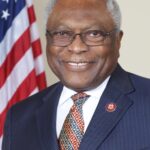
Rep. Jim Clyburn
Rep. Jim Clyburn of South Carolina, assistant leader of the House Democratic Caucus, has a similar response to colleagues who separate their Christian identity from concrete service.
“I ask them: Show me what you mean. Don’t tell me what you mean. Show me,” he says, citing from James 2:16 that one cannot say “Go in peace; keep warm and well fed” and do nothing to help someone. “You have to feed them. You have to clothe them. Because faith without works is dead.”
In the face of chaos spurred by Christian nationalism in the body he has served for over 30 years, Clyburn says he has begun reaching out to members of different factions within his own party, recognizing that they “need to demonstrate some leadership in the very near future to make sure this country doesn’t to go over the edge.”
Inaction Is Not an Option
“We need democracy to deliver more for people who have been left out,” says Kleinfeld. And in bridging that connection, she sees Catholics as having a special role. “Almost every other religious group is on one side of the aisle or the other. It’s really quite stunning. Catholics are the only group that are pretty evenly divided in Republicans and Democrats.”
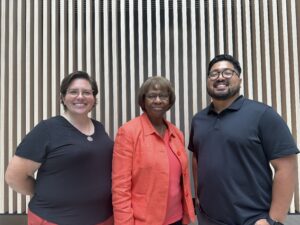
Sr. Eilis McCulloh, HM, Joan F. Neal, and Colin Martinez Longmore interviewed a range of democracy advocates and experts for Season 3 of the Just Politics podcast, produced in collaboration between NETWORK and U.S. Catholic magazine.
To hear more from the conversations encapsulated in this article, visit uscatholic.org/justpolitics
or networklobby.org/just-politics-podcast/
Kleinfeld advises, “What you need to start doing is both talking to people on the other side but then working with people on the other side on things you find you agree on. And this is really important, because finding those instances of agreement requires some deep conversation. It also requires constructive engagement with the system. … It can show people that the government can work. It can show people the humanity of the other side. And ideally it eventually moves into more political change.”
Rep. Clyburn says that fixing its own faults is something that makes America great.
“COVID-19 exposed some faults in our system that needed to be repaired,” he notes. And that inspired him to bring together Members of Congress from rural districts to get access to broadband included in the Bipartisan Infrastructure Law. The result was a $65 billion investment to make high-speed internet available to all people in the U.S.
Baird agrees that promoting policy that affords people what they need to participate more fully in society amounts to “strengthening the foundation of our democracy,” which gives future generations a better chance to realize the dream Dr. King talked about.
“We’re called to be in the political marketplace and to speak truth to power and to do it within the context of the Gospel and the social teachings,” she says. One failing Baird laments is how the racial divide in the U.S. makes it much harder for people to find solidarity with one another.
“If I’m white and poor in America, I don’t see what I have in common with poor people of color in America,” she notes. “But you have more in common with poor people of color than you have with the wealthy — that you have nothing in common except the color of your skin!”
Baird recalls that, when Dr. King called for a poor people’s campaign, that’s when people got upset. “When he started talking about bringing people together from every different background,” she says, “that became a threat to the power structure.”
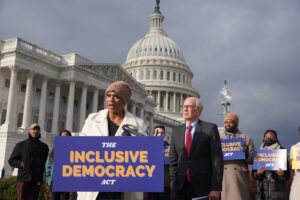
Rep. Ayanna Pressley of Massachusetts speaks outside the U.S. Capitol on Dec. 6 as she and Senator Peter Welch of Vermont introduced the Inclusive Democracy Act. The bill seeks to end felony disenfranchisement, a measure that disproportionately keeps Black and Brown people in the U.S. from voting.
Stewart of the League of Women Voters affirms the value of getting engaged: “So often in my interactions with people, they don’t always recognize how important their perspective is. They think everyone may feel that way, they don’t know the value that it brings. And every voice, collectively, has so much power.” Baird says that — especially as a Black woman — she struggles with people who say they are so demoralized by U.S. politics that they aren’t going to.
“Things do change. It may not change as quickly as we want or in the exact way that we want,” she says, but, “people died for the simple right to vote.”
Stewart asserts that who we elect matters: “Those are now people who make decisions on behalf of your family, on behalf of your life, your access, your ability to move and have potential services around the country,” she says. “And so it’s a really big deal, not only election day, but the impact of who’s elected.”
Kleinfeld says some people are resistant to holding onto a system that seems to be broken, but she cautions, “There’s not been a better system for peacefully changing power, peacefully choosing leaders who represent you. And that’s a lot to throw out.”
“Perhaps we have to go through this to realize how fragile democracy is, but what a gift it is,” says Baird. “I think we have to understand the power of the vote, the power of people coming together.”







